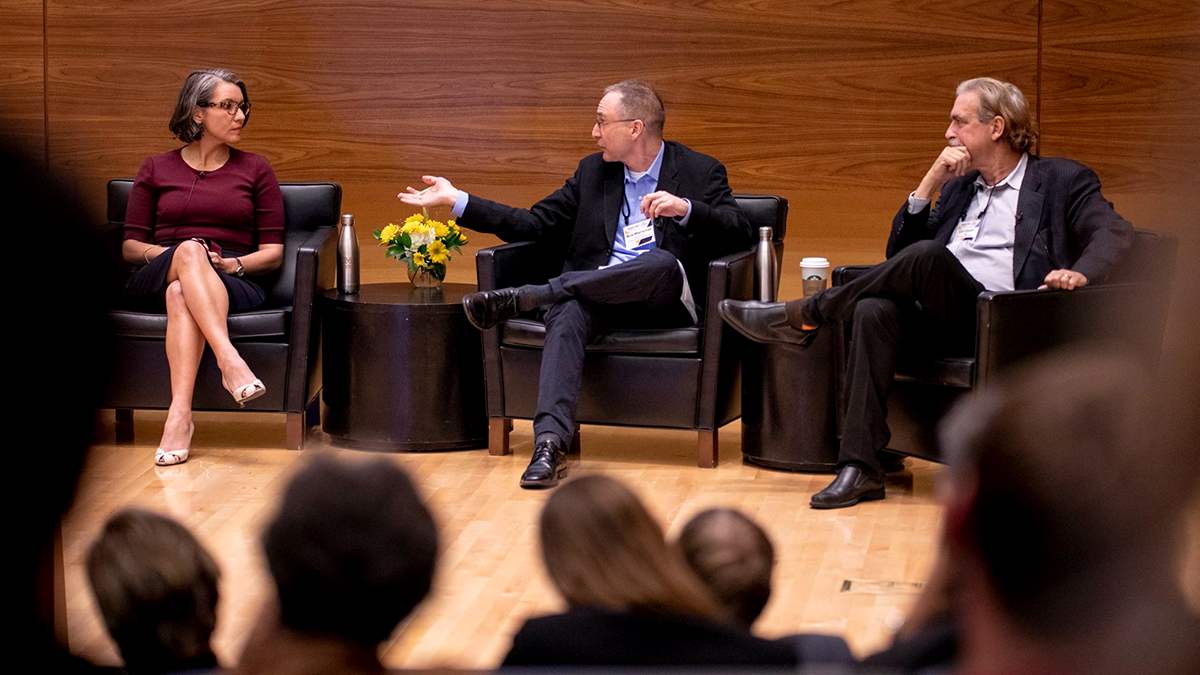Friday News – Vanderbilt Receives STEM Designation, Michigan Ross Honored by AACSB, and More

Let’s take a look at some of the biggest stories from this week, including the new Vanderbilt STEM designation at the university’s Owen Graduate School of Management.
Vanderbilt MBA Finance Concentration Receives STEM Certification – News & Events
The Owen Graduate School of Management at Vanderbilt University has announced that, starting this fall, its finance concentration will be a STEM degree program. This gives international students the opportunity to extend post-completion Optional Practical Training (OPT) in the US by 24 months.
Sue Oldham, Associate Dean, MBA Programs Operations, says, “We were able to work with our faculty to ensure that this STEM designation in the Finance concentration is one that would have an immediate impact, not only for our current students but for all prospective students… [It] is a direct result of the leadership team here listening to what our students are saying, specifically our international students.”
The OPT program enables international students to remain in the United States for 12 months in order to receive work training. With the new STEM designation, this period has been extended an additional 24 months for international finance students to build their careers. For more on the new Vanderbilt STEM designation, click here.
Michigan Ross Dialogue About The Future of Business Named for “Innovation that Inspires” – Michigan Ross News Blog
A discussion that took place last year at the University of Michigan Ross School of Business has been selected by the Association to Advance Collegiate Schools of Business (AACSB) for its contribution to academic thought and practice across the b-school community and the world at large.
“Working Toward Shared Prosperity: An Academic-Executive Dialogue,” included academics, along with business, labor, government, and nonprofit leaders who seek to improve conditions of employment and economic growth via practical solutions. Participants and attendees of the discussion came away with renewed energy toward enabling their academic work to address real world issues.

“Working Toward Shared Prosperity: An Academic-Executive Dialogue” earned the coveted 2019 Innovations That Inspire designation by the Association to Advance Collegiate Schools of Business (AACSB) / Photo via michiganross.umich.edu
The talk was a partnership between Michigan Ross and The Aspen Institute. Read more about the discussion, the AACSB, and the Aspen Institute here.
Economic and Environmentally Sustainable Solutions at the Forefront for the University of Toronto’s NeXus Consulting Group – Rotman News
The University of Toronto’s Rotman School of Management announced five of its MBA students joining its consulting group, NeXus Enterprises, which focuses primarily upon sustainability and social impact in its practice.
Founded in 2005, NeXus has worked with clients in 10 different countries to assist them in business planning, market research, financial modeling, scaling and expansion efforts. John Visser, a NeXus board member, says, “Social impact organizations are being challenged to deliver more value than ever before. Recent NeXus teams have executed a range of projects that have enabled boards and management teams to take their organizations to the next level.”
The new members of NeXus, all 2020 graduates of the Rotman MBA program, bring their expertise in technology, healthcare, marketing, design, engineering and construction to the group. Read here for more on NeXus and the Rotman team.
Marrying Science and Business Education For A More Sustainable Tomorrow – Fox School News
An industrial ecology project team at Temple University’s Fox School of Business, featuring an MBA student, a legal studies professor, and an engineering professor, have set an admirable example of how to meld disciplines.
Legal studies professor Daniel Isaacs Civil and Environmental Engineering Assistant Professor Avner Ronen, and MBA Vidya Sabella collaborated to solve a pressing problem: reducing wastes created by businesses.

(Left to right) Daniel Isaacs, Avner Ronen, and Vidya Sabbella / Photo via Joseph V. Labolito
Professor Isaacs (who is also head of the Global MBA program) says, “Business, technology, science and education should not be siloed. With broader educational opportunities like this one, environmental issues can be the drivers of innovation…Students and leaders alike need to start thinking about business in terms of what their obligations to future generations should be.”
You can read more about the team and project here.
MIT Food Systems Lab Announces Seven New Seed Grants – MIT News
The Abdul Latif Jameel Water and Food Systems Lab (J-WAFS) announced a new round of funding for an array of projects that will further innovation in farming and sustainable supply chain management in multiple countries. MIT Sloan is among the branches of the school to receive grant money.
Among the other innovations and developments will be increased food safety for everyday consumers; productivity technologies for small farmers, and water filtration methods for eliminating pollutants to food supplies. Thirty-four research teams applied for funding, and the directors of J-WAFS were tasked with choosing the best of the best.
Renee Robins, Executive Director of J-WAFS, says, “The broad range of disciplines that this applicant pool represents demonstrates how meeting today’s water and food challenges is motivating many diverse researchers in our community.”
Find more details on the seed grants and their recipients here.
5 Questions With UC Davis MBA Admissions Senior Director Andrea Shaw

In our latest installment of the MetroMBA “5 Questions” series, we speak with Andrea Shaw, Senior Director of Admissions at the UC Davis Graduate School of Management. Shaw discusses the tight-knit culture of the UC Davis MBA program, what students can expect, and what qualities define the program.
How does UC Davis help MBA applicants who don’t come from a traditional business or quantitative background?
“Students come to us from across industries, functions, and from around the world. We pride ourselves on being a tight-knit and collaborative community where conversations directly happen between faculty, staff, and students. Our curriculum also allows students to choose between many different career paths especially given the connections we have across other UC Davis schools.
For students coming from a non-business background or who are nervous about starting, we’re a school that really fits. Many schools have 600 students in a full-time program. We only have 50 students. That allows us to personalize the journey of each student.
Also, UC Davis doesn’t believe in just throwing our students into the program. We get to know our students and their needs—what they’re looking for, their strengths, weaknesses, etc. Part of that knowledge comes from our highly robust orientation where we spend almost a month before school starts to really engage with our students.

Andrea Shaw, Senior Director of UC Davis Graduate School of Management Admissions
During orientation, we spend a tremendous amount of time learning about our MBA class. There’s a significant career focus with discussion topics focused on networking, resume building, LinkedIn, etc. However, what the orientation is most known for is helping our students understand their emotional intelligence and develop their story through exercises and experiential learning.
Students have said in surveys that it’s the orientation that solidifies that they’ve made the right decision to come here. Those first few weeks are critical for setting them up for success.”
What type of culture defines UC Davis?
“The two words that continually come up from students, alumni, and faculty are “kind and compassionate.” We are driven toward success, but nice. It’s the idea of compassionate leadership, which research has shown to be necessary for true business growth. We even have an entire series that students can take to develop these skills, including awareness of themselves and others. Kindness and compassion are woven into every aspect of our culture, starting at the top with our dean.
Our culture is also defined by our location in a college town instead of a city. I love Davis as a city, community, and a place to go to college. It’s safe, comfortable, and all the energy revolves around the college.
We’re also really focused on what we do best as a university—biotechnology, sustainability, agriculture. Those sorts of segments and industries are very tied to our culture, university, and research. So, someone interested in Wall Street finance might not fit as well as someone interested in biotech.
Finally, because we’re a small community, you can really stand out. There are not a lot of politics to hold you back. You can get very involved, and there are fewer people vying for the same positions, so you can do as much as you want. This is highly beneficial for students who have a particular passion that they want to explore. For example, I know an MBA student who started a Women in Leadership organization because that was something she was passionate about, and it happened in a few conversations.”
Can you describe the qualities that UC Davis students possess?
“Other than the typical GMAT scores, GPA, and years of work experience, we look for applicants who know what they want to do with their MBA. Candidates should have a focus for the post-MBA career while also remaining open-minded about new opportunities. After all, an MBA is meant to be a transformative experience.
We also look for highly competent individuals who are professional in their verbal and written communications with us. We pride ourselves on being able to find jobs for all our students, so there’s a benchmark we look for—well-rounded students that have many different qualities. Going back to this idea of collaborative and kind, we look for candidates who are good team players and who see the value of working in groups because we have a lot of group work.
Finally, we look holistically at the class and how everyone will learn from each other. We look for a diverse class with students from a wide variety of backgrounds and industries. Everyone should be unique while still representing the essential qualities we love: kindness, compassion, and collaboration.”
If you could give one piece of advice to an MBA applicant interested in UC Davis, what would it be?
“Confidence! So much of what MBAs lack is confidence. The problem is that if you don’t think you can succeed, you won’t.
When you fill out your application and come in for your interview, we want confidence. Confidence is doing your research (knowing UC Davis), knowing who you are, and knowing your story. It’s also about being authentic. All of that leads to being confident in who you are and what you want. That will come across with us; it will come across anywhere.

“Confidence! So much of what MBAs lack is confidence. The problem is that if you don’t think you can succeed, you won’t,” Shaw says.
Remember, first impressions matter. That’s where that confidence helps too. If you come into a situation confidently, those first impressions are strong.”
What is your favorite San Francisco-focused business blog/website?
“I would say for applicants who are looking at schools in the Davis area, Metro-Edge.org is an excellent website. This is a website for young professionals in the Sacramento area. You’ll find events, gatherings, news, and more. It’s really focused on change and responsibility, and that’s great.
I also have to give a little plug to all of our social media accounts. Follow us on LinkedIn, Twitter, and Facebook for the latest news and insights. We also have MBA Showcase days coming up on January 26, February 9, and Feb 23.”
The Northeast Region’s Top Accelerated MBAs

The numerous advantages of an accelerated MBA start with one that’s particularly appealing–low cost. And while accelerated programs are more affordable, they are by no means less valuable or challenging than two year programs. In fact, they can be quite intensive in that they allow students to leverage their undergrad business education directly to MBA studies by covering core requirements.
Are Business Schools Equipped to Handle Climate Change?

The United Nations’ panel on climate change issued an alarming warning earlier this month. In order to avoid worsening events such as increasingly deadly storms and heat, the extinction of coral, and ever rising sea levels, member nations must act fast. Global leaders of business must pay particular attention to this warning, as the world economy will need to transform in order to support the vital decrease of carbon emissions.
Harvard Faculty Discuss Recent Chinese Tariffs, and More – Boston News

Let’s explore some of the most interesting stories that have emerged from Boston business schools this week.
Trade War or War of Words? – Harvard Business School Blog
Following the Trump administration’s recent announcement of 25 percent tariffs on 1,000 Chinese exports, Bill Kirby and Willy Shih, Harvard Business School faculty experts on China, took to the HBS blog to “trade theories on the best path forward for the world’s two largest economies.”
Both experts point to economic shifts in the 1980s, which, not incidentally, was the decade in which Donald Trump started to become a household name. Kirby notes that the major trade distinctions between the United States and Japan, specifically regarding the auto-manufacturing industry, set a precedent. In that, the United States began to firmly invest in Japanese car companies like Honda and Toyota, building their own domestic manufacturing plants. Kirby suspects, however, that the Trump administration may not be as open to that kind of investment. “If Chinese companies wanted to improve access to American markets by investing in the US, would the administration be open to it?” he asks. “They ought to be, in my view. But my suspicion is that that’s not the outcome that this administration is looking for. They’re looking for a miraculous recovery of American-based manufacturing exporting to a Chinese market, not a particularly good match.”
Shih, staying on the topic of the ’80s, offers a different opinion, saying; “I think the real issue is industrial policy on the Chinese side competing with a lack of industrial policy on the U.S. side and the consequences of that. Going back to the mid-1980s, the Chinese government has been mapping a pathway for the country to become a modern country (just as the Koreans, Taiwanese, and the Japanese did before, except on a much larger scale). The Chinese have identified core capabilities that they want to see inside the country, and they’ve been methodically working on that over the last 30-plus years. I’d argue the positive trade balance with the US reflects the progress they’ve made.”
You can read the full conversation between Kirby and Shih here.
An Easy Internship Trick from Kayla Humel ’18 – Simmons Blog
Current Simmons School of Management student body president Kayla Humel, ’18, wrote candidly about the impact of the Student Government Association (SGA) on her recent internship at Puma and future career plans.
“First and foremost, [SGA has taught me] the power of good communication. When the e-board is communicating with one another, event planning is exponentially easier. When SGA is communicating with organizations, processes like budgets occur seamlessly. Good communication is crucial to success in any organization.”
Humel threw her hat in the presidential race because she “saw opportunities to improve processes between SGA and the other organizations on campus. I knew that SGA could create change on campus and I wanted to play a major part in that.”
You ca check out more about her Simmons experience here and watch an interview with Humel about her internship below.
Wield Polarization to Build Positive Change – MIT Sloan Newsroom
MIT Sloan School of Management sustainability initiative director Jason Jay used his recent TEDx talk as an opportunity to share some strategic advice on how to more effectively spark difficult conversations. “The voltage feels so high that we simply avoid conversations out of fear of getting shocked. But I like to think about that polarization as a kind of energy.”
- Draw a contrast between what others might expect you to do and what you’re really trying to do.
- Clarify the values underlying your positions, and do the same with the people you’re talking to.
- Make it clear that you aren’t meeting simply to bargain over these values, but to embrace tension and find new ideas.”
You can check out Jay’s TEDx talk at Hofstra University below and learn more about his work here.
The 5 Important Things You’ll Need to Know When Getting an MBA

If you’ve gone through the rigamarole of an MBA application, chances are you’re feeling a bit taxed (no pun intended). Don’t slow down now! Sometimes when you have your life and education under the microscope it’s helpful to get a gentle reminder from a reliable source—like us—of what you hoped to get out of the degree in the first place. Here are a few tips that might help calibrate your b-school compass:
Practice On The Field
Cliff Oxford, founder of the Oxford Center for Entrepreneurs, wrote in the New York Times that certain traditional MBA programs are “like having athletes studying game film but never practicing on the field.” This is why many schools encourage students to apply for internships during enrollment or summer semesters. These opportunities can be competitive—especially if you have your mind set on a large company—but don’t let that deter you.
There are many ways to stay connected with the global marketplace, where you will be employed in only two years. For starters, keep applying and remain alert to positions that may have a greater potential for longevity. Interviews that don’t lead to an internship are still essential experiences. If your chosen program doesn’t have adequate outlets for students to engage with employers, ask for them.
Let A Mentor Set The Pace
Mentorships reinforce the idea that there’s no substitute for experience. For students too intimidated to reach out to a professor, consider that mentorships may be the most rewarding part of their job.
Many schools offer a mentorship program built into the curriculum. Large schools like the University of Oregon and the University of Miami pair students with local professionals to “meet regularly throughout the academic year to discuss everything from study habits to career choices.” Schools have reported that these connections are pivotal for students in achieving their ideal positions and cultivating life-long relationships in the field.
Mentorship is also a staple of the career path designed for students at powerhouse business schools like the Yale School of Management, which recently revamped its WE@Yale program.
Change Your Perspective
When under pressure, remember to give yourself a break. Exercise and meditation are steadfast options, but use your imagination. Jerry Seinfeld reportedly displayed images from the Hubble Space Telescope on the walls of his writing room to calm his nerves. ”I don’t find being insignificant depressing. I find it uplifting.”
Completing your MBA is a personal exploration above all else. Don’t forget your true entrepreneurial spirit while finding your footing. After all, changing ones career is the second most common reason, according to students, that they pursue an MBA in a first place.
Experiment With Electives
Special projects and electives are a chance to step out of your comfort zone. These courses are updated on a yearly basis, meaning that they cover cutting-edge topics that can open up new worlds and help you garner skills that separate you from the rest.
For example, the Stern Signature Project at the NYU Stern Center for Business and Human Rights recently led students to create a business plan “focused on sustainable employment and profit” for a private Kenyan social enterprise.

The NYU Stern Center for Business and Human Rights launched in 2013, focusing on various issues like manufacturing, sustainability, and much more.
Get To Know Your Pack
A drive to succeed doesn’t mean that you have to be the lone wolf on Wall Street. Every MBA program has students who come from unique backgrounds, cultures, and histories. These are your future colleagues. They’re also hidden mentors who may be your most valuable supporters.
Many schools, like the Wharton School at the University of Pennsylvania, actively acclimate their students together with unique Olympic-like events, helping bridge the various cultural gaps of the incoming students. Not only are these events fun, unless you hate being outside or sack races, but they are potentially powerful networking events for you and your peers.
